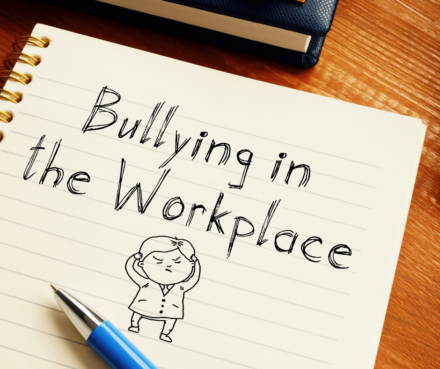
Allegations of bullying at work; how should employers respond?
22nd January 2024 by Alana Penkethman
Most employers will try to protect staff from bullying in the workplace, but sometimes it is hard to know what to do about the problem.
A third (32 per cent) of UK workers have experienced bullying masked as banter, research has found.* The Anti-Bullying Alliance charity has a useful explainer about the difference between banter and bullying, which applies to all ages.
‘‘Bullying at work can affect an employee’s work performance and damage their mental health, sometimes resulting in long periods off work or resignation. Employers should make sure they can effectively respond to allegations of bullying at work and protect themselves from claims,’ says Alana Penkethman, employment expert at Laceys Solicitors.
While there is no law specifically against bullying, it can lead to claims for personal injury, as well as tribunal claims for constructive unfair dismissal. If the bullying fits the definition of harassment under the Equality Act 2010 and relates to a protected characteristic, such as race, religion, or sex this is discrimination. Employers can be liable for an employee’s discriminatory bullying of a colleague. Employers can also be vicariously liable for damages from their employee’s harassment of another employee under the Protection from Harassment Act 1997.
Alana highlights the key elements of good practice if you need to respond to an allegation of bullying at work.
Supporting employees
Supporting employees who allege that they have been bullied is crucial. Employees should be treated sensitively and should be reassured that their complaint is being taken seriously, and that the allegations will be treated as confidential.
An employee making a complaint of discrimination will usually be protected from victimisation. Even if there is no potentially discriminatory element to the allegations, employers should encourage a culture in which employees feel supported and that there will be no repercussions from making allegations in good faith.
Depending on the nature of the allegation, the employee may prefer to speak to a HR manager or colleague of the same gender.
Check your policies
Check your policies to ensure the appropriate steps are followed within the time frame specified. Where an investigation is going to be carried out, the employee should be made aware of the steps and the likely time scale. Any delays should be communicated to the employee.
Offering support through referral to an employee assistance programme or counselling may be helpful. This applies to both the employee alleging bullying and the employee who is the subject of the allegations.
Should we separate the employees?
If the allegations are serious and the employees work in the same area or team, the employer should consider if they should be separated or whether work responsibilities or reporting lines can be changed. This is to minimise contact between the alleged perpetrator and the individual alleging bullying while an investigation is carried out.
As far as possible, care should be taken not to penalise either individual. If there is no obvious solution, please speak to us.
Should we suspend?
Suspending the alleged perpetrator should only be done as a last resort, and suspension should not be an automatic response. Any suspension should be for as short a time as possible because an unnecessarily long period could be a breach of trust and confidence. This risks an unfair dismissal claim, as well as potentially affecting the wellbeing of the suspended employee.
We recommend keeping a record of the decision-making process.
Investigating allegations of bullying
Employers should consider if the issues can be resolved informally, as required by the Acas code of practice on disciplinary and grievance procedures. The options can be discussed with the employee making the allegations. Often, allegations of bullying will require investigating.
Employers should investigate promptly but also need to ensure that the investigation is reasonably thorough. The investigator can be an HR professional or a senior manager. In some cases, it may be necessary to appoint an external investigator if there are no suitable individuals available, for instance because an otherwise suitable manager is good friends with the alleged perpetrator.
Very often there will be different perspectives and the investigator should go into the investigation with an open mind and look for evidence that can help them reach reasoned findings. Both parties should be asked if there is anyone who they believe could be a potential witness and what evidence they could provide. Along with speaking to witnesses, depending on the allegations, the investigator may need to review emails, online chat in virtual meetings, social media, and CCTV footage.
Again, the process must be kept confidential and this must be explained to any witnesses who are interviewed. Both the alleged victim and perpetrator must be kept informed if there are any significant delays.
Action following investigation
Depending on your policy, another manager may need to be brought in to meet with the employee making the complaint and to review all the evidence before reaching a decision on the complaint. The employee should be offered a right of appeal if their allegations are rejected.
Where the findings are that bullying did occur, the next step may be to deal with the subject of the complaint under your disciplinary policy. This could result in a warning or dismissal.
Protecting your business
Employers need to have strong and up-to-date policies on equality, diversity and inclusion and roll out regular training to employees to bring these into practice. Along with creating a positive, fair and safe working environment, this can help employers defend harassment claims under the Equality Act 2010. These steps can also help establish the statutory defence of having taken reasonable steps to prevent the harassment.
How we can help
We can ensure that you have appropriate policies in place and guide you through the process when allegations of bullying are made. If you would like to find out more, then please contact Alana Penkethman at a.penkethman@laceyssolicitors.co.uk or 01202 377 872.



